Sustainability Strategies in Operations Management - Northampton
VerifiedAdded on 2023/06/16
|10
|2767
|411
Report
AI Summary
This report provides a comprehensive study of sustainability within the context of operations management, focusing on the importance of adopting sustainability strategies for businesses. It includes a literature review exploring sustainability initiatives, justifications for adopting these strategies, and potential benefits. The report identifies Unilever as a case study, examining its sustainability initiatives related to resource conservation and organic product production. It also discusses the future of sustainability initiatives, particularly plastic recycling, and concludes that embracing sustainability is crucial for long-term business value and environmental protection. Desklib offers a wealth of similar solved assignments and past papers for students.
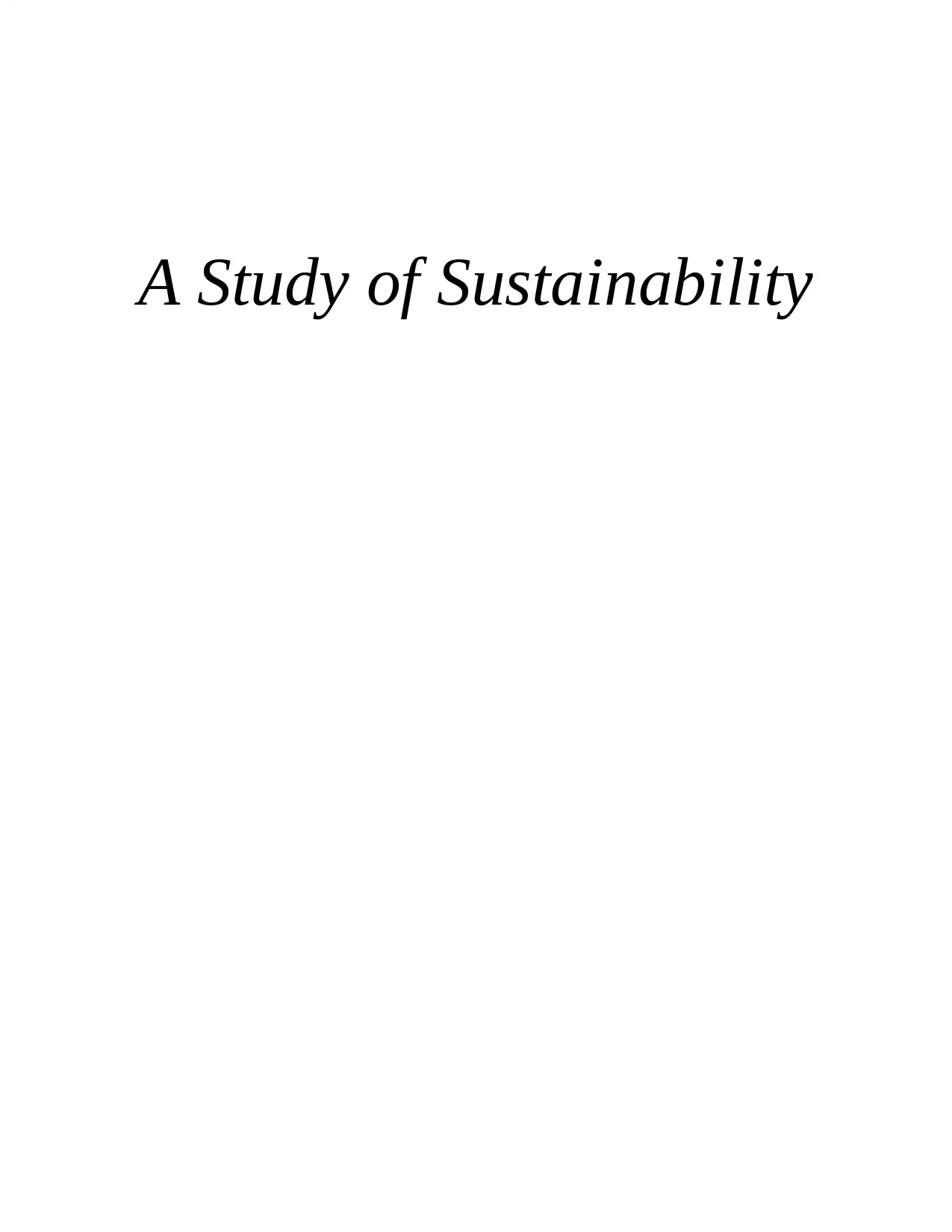
A Study of Sustainability
Paraphrase This Document
Need a fresh take? Get an instant paraphrase of this document with our AI Paraphraser
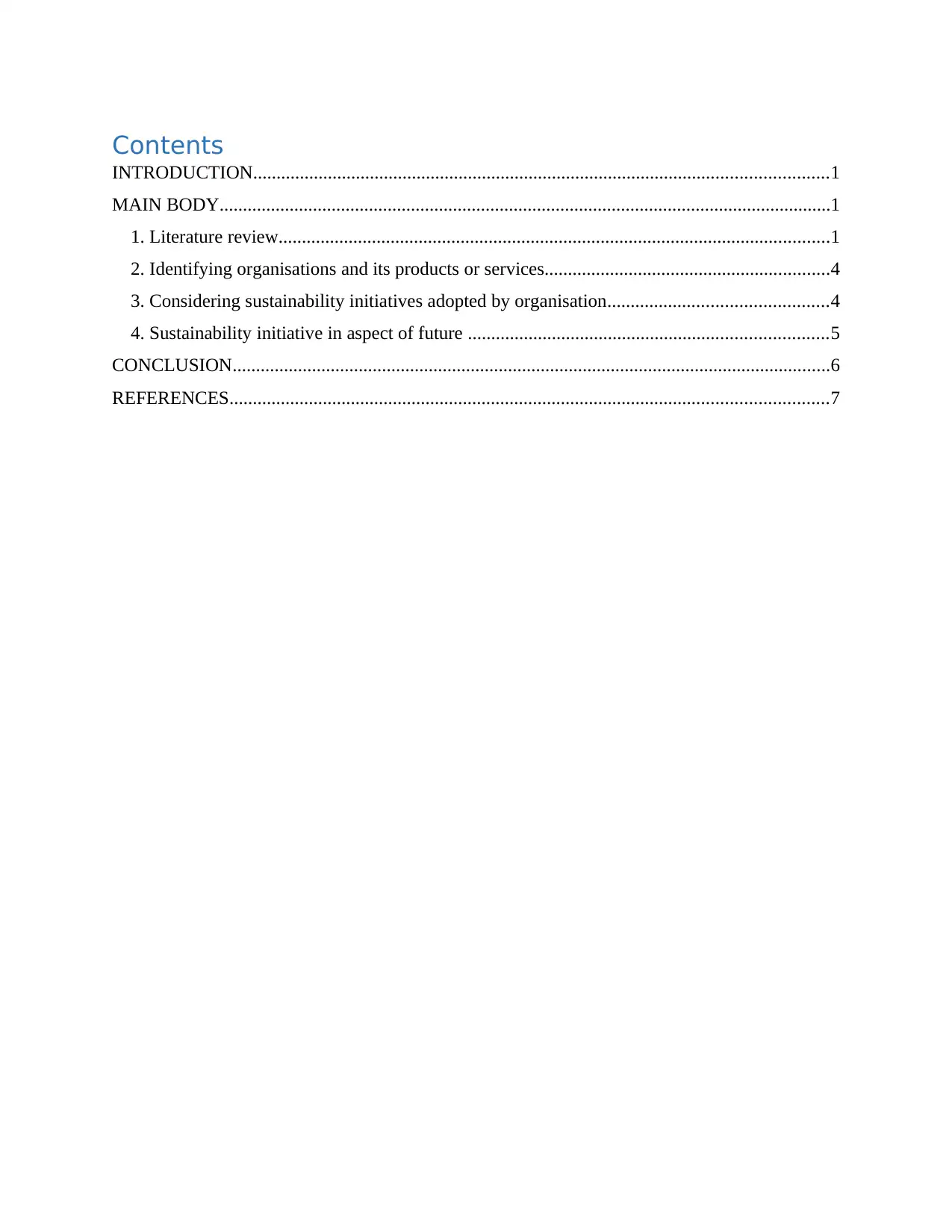
Contents
INTRODUCTION...........................................................................................................................1
MAIN BODY...................................................................................................................................1
1. Literature review......................................................................................................................1
2. Identifying organisations and its products or services.............................................................4
3. Considering sustainability initiatives adopted by organisation...............................................4
4. Sustainability initiative in aspect of future .............................................................................5
CONCLUSION................................................................................................................................6
REFERENCES................................................................................................................................7
INTRODUCTION...........................................................................................................................1
MAIN BODY...................................................................................................................................1
1. Literature review......................................................................................................................1
2. Identifying organisations and its products or services.............................................................4
3. Considering sustainability initiatives adopted by organisation...............................................4
4. Sustainability initiative in aspect of future .............................................................................5
CONCLUSION................................................................................................................................6
REFERENCES................................................................................................................................7
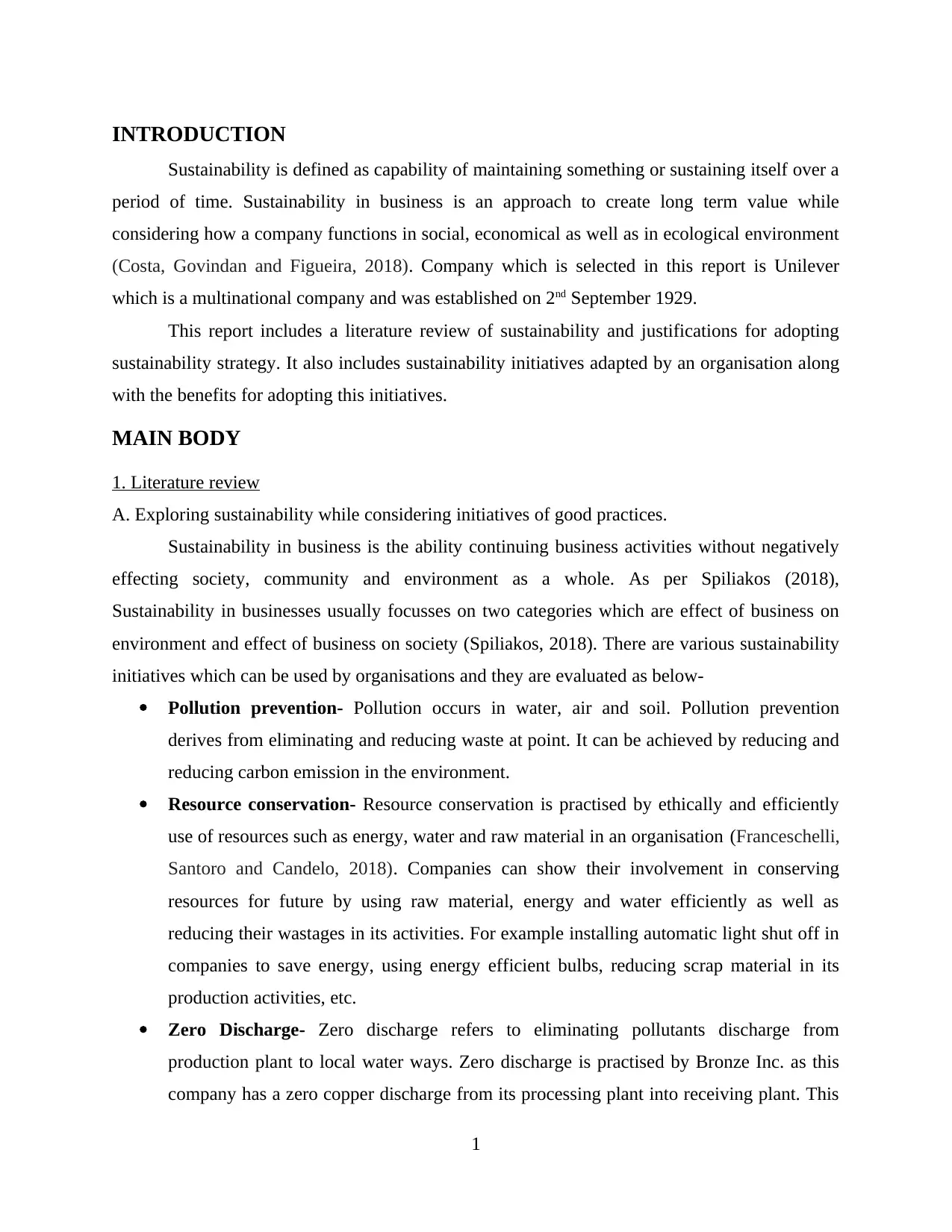
INTRODUCTION
Sustainability is defined as capability of maintaining something or sustaining itself over a
period of time. Sustainability in business is an approach to create long term value while
considering how a company functions in social, economical as well as in ecological environment
(Costa, Govindan and Figueira, 2018). Company which is selected in this report is Unilever
which is a multinational company and was established on 2nd September 1929.
This report includes a literature review of sustainability and justifications for adopting
sustainability strategy. It also includes sustainability initiatives adapted by an organisation along
with the benefits for adopting this initiatives.
MAIN BODY
1. Literature review
A. Exploring sustainability while considering initiatives of good practices.
Sustainability in business is the ability continuing business activities without negatively
effecting society, community and environment as a whole. As per Spiliakos (2018),
Sustainability in businesses usually focusses on two categories which are effect of business on
environment and effect of business on society (Spiliakos, 2018). There are various sustainability
initiatives which can be used by organisations and they are evaluated as below-
Pollution prevention- Pollution occurs in water, air and soil. Pollution prevention
derives from eliminating and reducing waste at point. It can be achieved by reducing and
reducing carbon emission in the environment.
Resource conservation- Resource conservation is practised by ethically and efficiently
use of resources such as energy, water and raw material in an organisation (Franceschelli,
Santoro and Candelo, 2018). Companies can show their involvement in conserving
resources for future by using raw material, energy and water efficiently as well as
reducing their wastages in its activities. For example installing automatic light shut off in
companies to save energy, using energy efficient bulbs, reducing scrap material in its
production activities, etc.
Zero Discharge- Zero discharge refers to eliminating pollutants discharge from
production plant to local water ways. Zero discharge is practised by Bronze Inc. as this
company has a zero copper discharge from its processing plant into receiving plant. This
1
Sustainability is defined as capability of maintaining something or sustaining itself over a
period of time. Sustainability in business is an approach to create long term value while
considering how a company functions in social, economical as well as in ecological environment
(Costa, Govindan and Figueira, 2018). Company which is selected in this report is Unilever
which is a multinational company and was established on 2nd September 1929.
This report includes a literature review of sustainability and justifications for adopting
sustainability strategy. It also includes sustainability initiatives adapted by an organisation along
with the benefits for adopting this initiatives.
MAIN BODY
1. Literature review
A. Exploring sustainability while considering initiatives of good practices.
Sustainability in business is the ability continuing business activities without negatively
effecting society, community and environment as a whole. As per Spiliakos (2018),
Sustainability in businesses usually focusses on two categories which are effect of business on
environment and effect of business on society (Spiliakos, 2018). There are various sustainability
initiatives which can be used by organisations and they are evaluated as below-
Pollution prevention- Pollution occurs in water, air and soil. Pollution prevention
derives from eliminating and reducing waste at point. It can be achieved by reducing and
reducing carbon emission in the environment.
Resource conservation- Resource conservation is practised by ethically and efficiently
use of resources such as energy, water and raw material in an organisation (Franceschelli,
Santoro and Candelo, 2018). Companies can show their involvement in conserving
resources for future by using raw material, energy and water efficiently as well as
reducing their wastages in its activities. For example installing automatic light shut off in
companies to save energy, using energy efficient bulbs, reducing scrap material in its
production activities, etc.
Zero Discharge- Zero discharge refers to eliminating pollutants discharge from
production plant to local water ways. Zero discharge is practised by Bronze Inc. as this
company has a zero copper discharge from its processing plant into receiving plant. This
1
⊘ This is a preview!⊘
Do you want full access?
Subscribe today to unlock all pages.

Trusted by 1+ million students worldwide
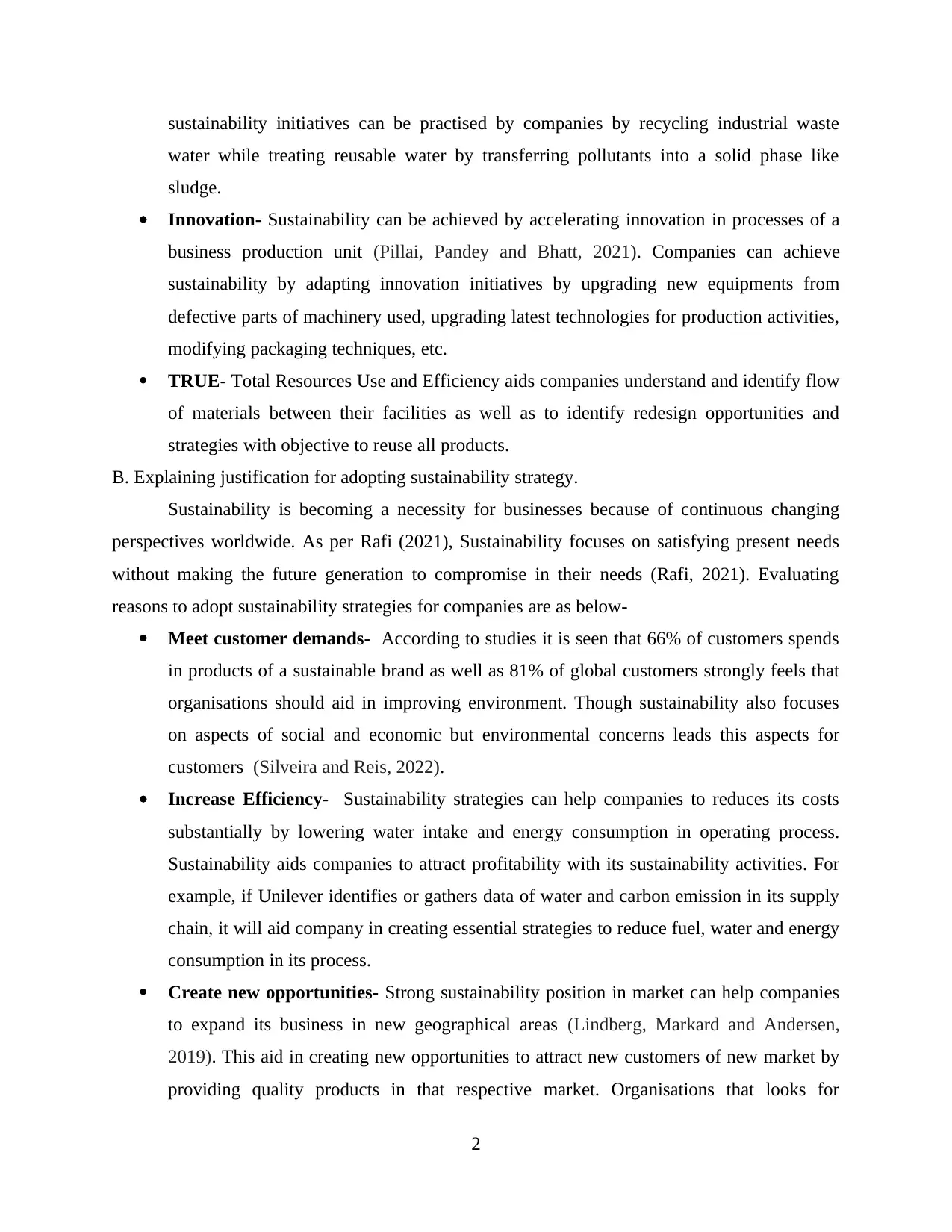
sustainability initiatives can be practised by companies by recycling industrial waste
water while treating reusable water by transferring pollutants into a solid phase like
sludge.
Innovation- Sustainability can be achieved by accelerating innovation in processes of a
business production unit (Pillai, Pandey and Bhatt, 2021). Companies can achieve
sustainability by adapting innovation initiatives by upgrading new equipments from
defective parts of machinery used, upgrading latest technologies for production activities,
modifying packaging techniques, etc.
TRUE- Total Resources Use and Efficiency aids companies understand and identify flow
of materials between their facilities as well as to identify redesign opportunities and
strategies with objective to reuse all products.
B. Explaining justification for adopting sustainability strategy.
Sustainability is becoming a necessity for businesses because of continuous changing
perspectives worldwide. As per Rafi (2021), Sustainability focuses on satisfying present needs
without making the future generation to compromise in their needs (Rafi, 2021). Evaluating
reasons to adopt sustainability strategies for companies are as below-
Meet customer demands- According to studies it is seen that 66% of customers spends
in products of a sustainable brand as well as 81% of global customers strongly feels that
organisations should aid in improving environment. Though sustainability also focuses
on aspects of social and economic but environmental concerns leads this aspects for
customers (Silveira and Reis, 2022).
Increase Efficiency- Sustainability strategies can help companies to reduces its costs
substantially by lowering water intake and energy consumption in operating process.
Sustainability aids companies to attract profitability with its sustainability activities. For
example, if Unilever identifies or gathers data of water and carbon emission in its supply
chain, it will aid company in creating essential strategies to reduce fuel, water and energy
consumption in its process.
Create new opportunities- Strong sustainability position in market can help companies
to expand its business in new geographical areas (Lindberg, Markard and Andersen,
2019). This aid in creating new opportunities to attract new customers of new market by
providing quality products in that respective market. Organisations that looks for
2
water while treating reusable water by transferring pollutants into a solid phase like
sludge.
Innovation- Sustainability can be achieved by accelerating innovation in processes of a
business production unit (Pillai, Pandey and Bhatt, 2021). Companies can achieve
sustainability by adapting innovation initiatives by upgrading new equipments from
defective parts of machinery used, upgrading latest technologies for production activities,
modifying packaging techniques, etc.
TRUE- Total Resources Use and Efficiency aids companies understand and identify flow
of materials between their facilities as well as to identify redesign opportunities and
strategies with objective to reuse all products.
B. Explaining justification for adopting sustainability strategy.
Sustainability is becoming a necessity for businesses because of continuous changing
perspectives worldwide. As per Rafi (2021), Sustainability focuses on satisfying present needs
without making the future generation to compromise in their needs (Rafi, 2021). Evaluating
reasons to adopt sustainability strategies for companies are as below-
Meet customer demands- According to studies it is seen that 66% of customers spends
in products of a sustainable brand as well as 81% of global customers strongly feels that
organisations should aid in improving environment. Though sustainability also focuses
on aspects of social and economic but environmental concerns leads this aspects for
customers (Silveira and Reis, 2022).
Increase Efficiency- Sustainability strategies can help companies to reduces its costs
substantially by lowering water intake and energy consumption in operating process.
Sustainability aids companies to attract profitability with its sustainability activities. For
example, if Unilever identifies or gathers data of water and carbon emission in its supply
chain, it will aid company in creating essential strategies to reduce fuel, water and energy
consumption in its process.
Create new opportunities- Strong sustainability position in market can help companies
to expand its business in new geographical areas (Lindberg, Markard and Andersen,
2019). This aid in creating new opportunities to attract new customers of new market by
providing quality products in that respective market. Organisations that looks for
2
Paraphrase This Document
Need a fresh take? Get an instant paraphrase of this document with our AI Paraphraser
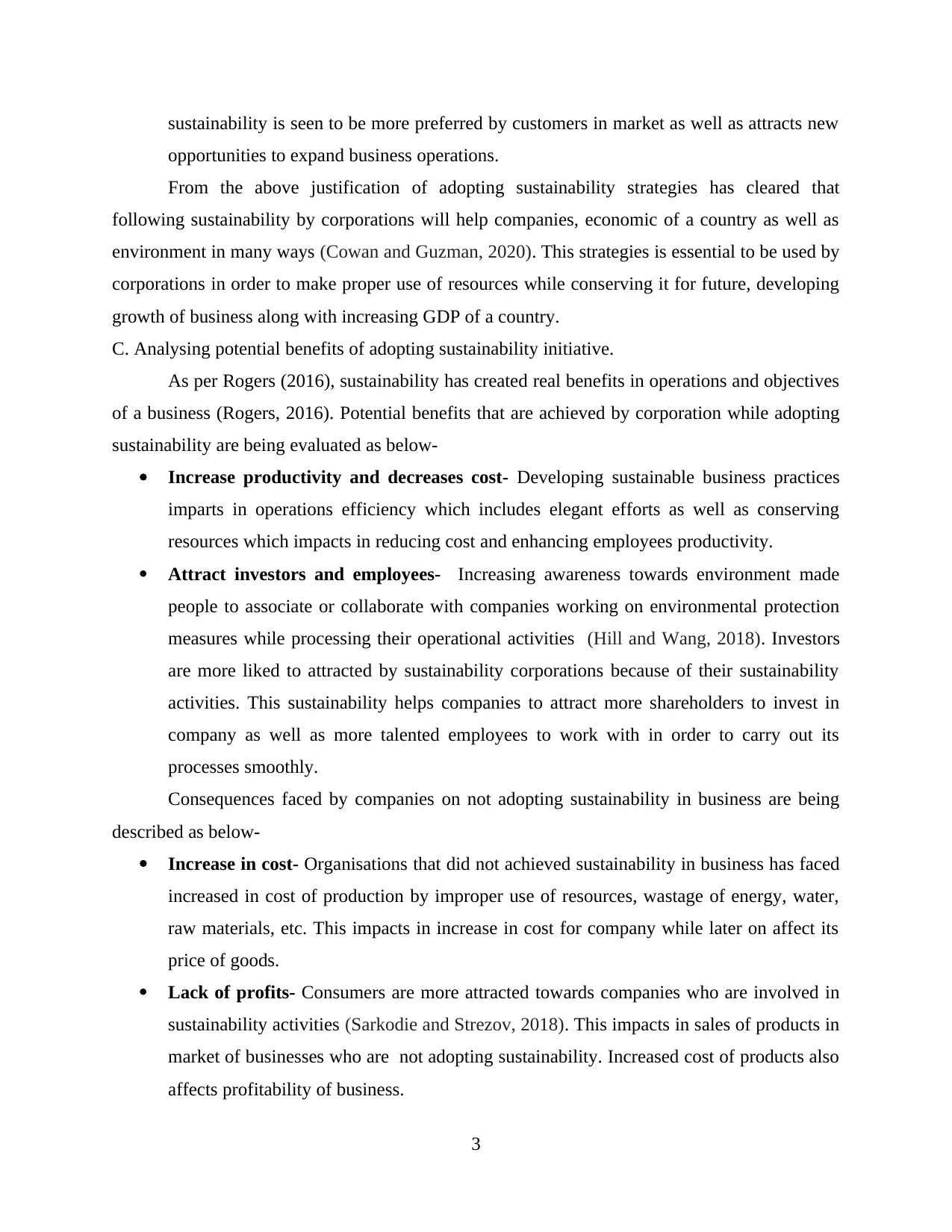
sustainability is seen to be more preferred by customers in market as well as attracts new
opportunities to expand business operations.
From the above justification of adopting sustainability strategies has cleared that
following sustainability by corporations will help companies, economic of a country as well as
environment in many ways (Cowan and Guzman, 2020). This strategies is essential to be used by
corporations in order to make proper use of resources while conserving it for future, developing
growth of business along with increasing GDP of a country.
C. Analysing potential benefits of adopting sustainability initiative.
As per Rogers (2016), sustainability has created real benefits in operations and objectives
of a business (Rogers, 2016). Potential benefits that are achieved by corporation while adopting
sustainability are being evaluated as below-
Increase productivity and decreases cost- Developing sustainable business practices
imparts in operations efficiency which includes elegant efforts as well as conserving
resources which impacts in reducing cost and enhancing employees productivity.
Attract investors and employees- Increasing awareness towards environment made
people to associate or collaborate with companies working on environmental protection
measures while processing their operational activities (Hill and Wang, 2018). Investors
are more liked to attracted by sustainability corporations because of their sustainability
activities. This sustainability helps companies to attract more shareholders to invest in
company as well as more talented employees to work with in order to carry out its
processes smoothly.
Consequences faced by companies on not adopting sustainability in business are being
described as below-
Increase in cost- Organisations that did not achieved sustainability in business has faced
increased in cost of production by improper use of resources, wastage of energy, water,
raw materials, etc. This impacts in increase in cost for company while later on affect its
price of goods.
Lack of profits- Consumers are more attracted towards companies who are involved in
sustainability activities (Sarkodie and Strezov, 2018). This impacts in sales of products in
market of businesses who are not adopting sustainability. Increased cost of products also
affects profitability of business.
3
opportunities to expand business operations.
From the above justification of adopting sustainability strategies has cleared that
following sustainability by corporations will help companies, economic of a country as well as
environment in many ways (Cowan and Guzman, 2020). This strategies is essential to be used by
corporations in order to make proper use of resources while conserving it for future, developing
growth of business along with increasing GDP of a country.
C. Analysing potential benefits of adopting sustainability initiative.
As per Rogers (2016), sustainability has created real benefits in operations and objectives
of a business (Rogers, 2016). Potential benefits that are achieved by corporation while adopting
sustainability are being evaluated as below-
Increase productivity and decreases cost- Developing sustainable business practices
imparts in operations efficiency which includes elegant efforts as well as conserving
resources which impacts in reducing cost and enhancing employees productivity.
Attract investors and employees- Increasing awareness towards environment made
people to associate or collaborate with companies working on environmental protection
measures while processing their operational activities (Hill and Wang, 2018). Investors
are more liked to attracted by sustainability corporations because of their sustainability
activities. This sustainability helps companies to attract more shareholders to invest in
company as well as more talented employees to work with in order to carry out its
processes smoothly.
Consequences faced by companies on not adopting sustainability in business are being
described as below-
Increase in cost- Organisations that did not achieved sustainability in business has faced
increased in cost of production by improper use of resources, wastage of energy, water,
raw materials, etc. This impacts in increase in cost for company while later on affect its
price of goods.
Lack of profits- Consumers are more attracted towards companies who are involved in
sustainability activities (Sarkodie and Strezov, 2018). This impacts in sales of products in
market of businesses who are not adopting sustainability. Increased cost of products also
affects profitability of business.
3
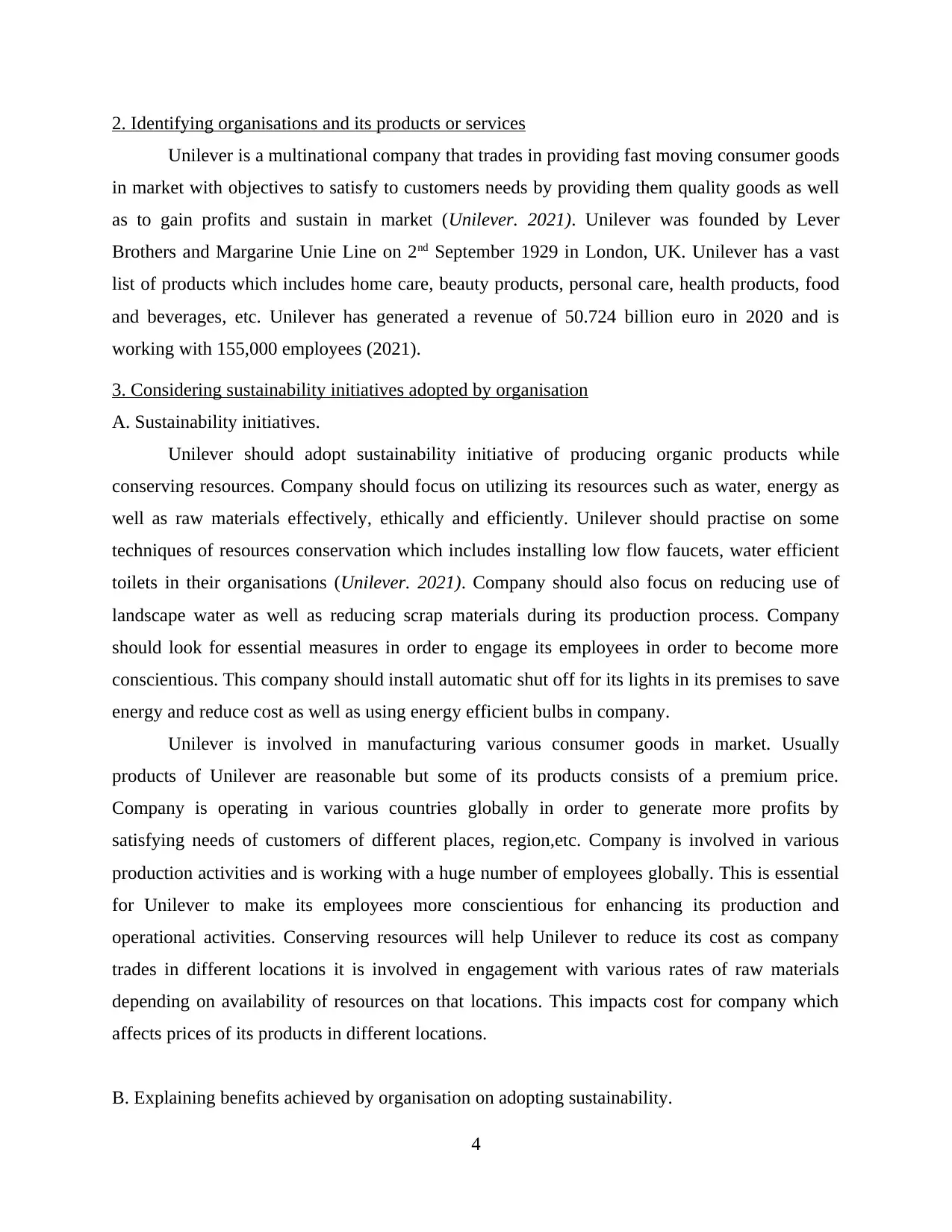
2. Identifying organisations and its products or services
Unilever is a multinational company that trades in providing fast moving consumer goods
in market with objectives to satisfy to customers needs by providing them quality goods as well
as to gain profits and sustain in market (Unilever. 2021). Unilever was founded by Lever
Brothers and Margarine Unie Line on 2nd September 1929 in London, UK. Unilever has a vast
list of products which includes home care, beauty products, personal care, health products, food
and beverages, etc. Unilever has generated a revenue of 50.724 billion euro in 2020 and is
working with 155,000 employees (2021).
3. Considering sustainability initiatives adopted by organisation
A. Sustainability initiatives.
Unilever should adopt sustainability initiative of producing organic products while
conserving resources. Company should focus on utilizing its resources such as water, energy as
well as raw materials effectively, ethically and efficiently. Unilever should practise on some
techniques of resources conservation which includes installing low flow faucets, water efficient
toilets in their organisations (Unilever. 2021). Company should also focus on reducing use of
landscape water as well as reducing scrap materials during its production process. Company
should look for essential measures in order to engage its employees in order to become more
conscientious. This company should install automatic shut off for its lights in its premises to save
energy and reduce cost as well as using energy efficient bulbs in company.
Unilever is involved in manufacturing various consumer goods in market. Usually
products of Unilever are reasonable but some of its products consists of a premium price.
Company is operating in various countries globally in order to generate more profits by
satisfying needs of customers of different places, region,etc. Company is involved in various
production activities and is working with a huge number of employees globally. This is essential
for Unilever to make its employees more conscientious for enhancing its production and
operational activities. Conserving resources will help Unilever to reduce its cost as company
trades in different locations it is involved in engagement with various rates of raw materials
depending on availability of resources on that locations. This impacts cost for company which
affects prices of its products in different locations.
B. Explaining benefits achieved by organisation on adopting sustainability.
4
Unilever is a multinational company that trades in providing fast moving consumer goods
in market with objectives to satisfy to customers needs by providing them quality goods as well
as to gain profits and sustain in market (Unilever. 2021). Unilever was founded by Lever
Brothers and Margarine Unie Line on 2nd September 1929 in London, UK. Unilever has a vast
list of products which includes home care, beauty products, personal care, health products, food
and beverages, etc. Unilever has generated a revenue of 50.724 billion euro in 2020 and is
working with 155,000 employees (2021).
3. Considering sustainability initiatives adopted by organisation
A. Sustainability initiatives.
Unilever should adopt sustainability initiative of producing organic products while
conserving resources. Company should focus on utilizing its resources such as water, energy as
well as raw materials effectively, ethically and efficiently. Unilever should practise on some
techniques of resources conservation which includes installing low flow faucets, water efficient
toilets in their organisations (Unilever. 2021). Company should also focus on reducing use of
landscape water as well as reducing scrap materials during its production process. Company
should look for essential measures in order to engage its employees in order to become more
conscientious. This company should install automatic shut off for its lights in its premises to save
energy and reduce cost as well as using energy efficient bulbs in company.
Unilever is involved in manufacturing various consumer goods in market. Usually
products of Unilever are reasonable but some of its products consists of a premium price.
Company is operating in various countries globally in order to generate more profits by
satisfying needs of customers of different places, region,etc. Company is involved in various
production activities and is working with a huge number of employees globally. This is essential
for Unilever to make its employees more conscientious for enhancing its production and
operational activities. Conserving resources will help Unilever to reduce its cost as company
trades in different locations it is involved in engagement with various rates of raw materials
depending on availability of resources on that locations. This impacts cost for company which
affects prices of its products in different locations.
B. Explaining benefits achieved by organisation on adopting sustainability.
4
⊘ This is a preview!⊘
Do you want full access?
Subscribe today to unlock all pages.

Trusted by 1+ million students worldwide
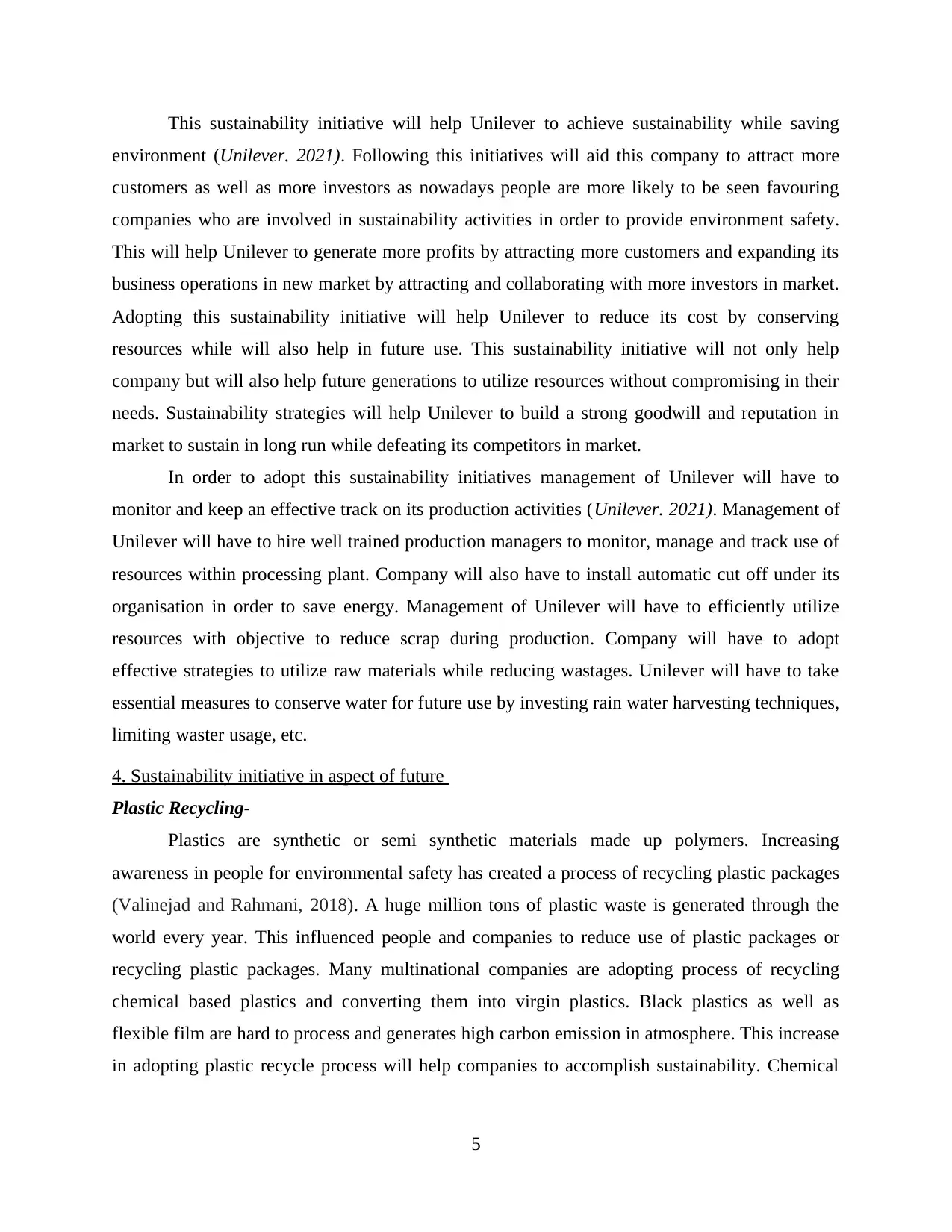
This sustainability initiative will help Unilever to achieve sustainability while saving
environment (Unilever. 2021). Following this initiatives will aid this company to attract more
customers as well as more investors as nowadays people are more likely to be seen favouring
companies who are involved in sustainability activities in order to provide environment safety.
This will help Unilever to generate more profits by attracting more customers and expanding its
business operations in new market by attracting and collaborating with more investors in market.
Adopting this sustainability initiative will help Unilever to reduce its cost by conserving
resources while will also help in future use. This sustainability initiative will not only help
company but will also help future generations to utilize resources without compromising in their
needs. Sustainability strategies will help Unilever to build a strong goodwill and reputation in
market to sustain in long run while defeating its competitors in market.
In order to adopt this sustainability initiatives management of Unilever will have to
monitor and keep an effective track on its production activities (Unilever. 2021). Management of
Unilever will have to hire well trained production managers to monitor, manage and track use of
resources within processing plant. Company will also have to install automatic cut off under its
organisation in order to save energy. Management of Unilever will have to efficiently utilize
resources with objective to reduce scrap during production. Company will have to adopt
effective strategies to utilize raw materials while reducing wastages. Unilever will have to take
essential measures to conserve water for future use by investing rain water harvesting techniques,
limiting waster usage, etc.
4. Sustainability initiative in aspect of future
Plastic Recycling-
Plastics are synthetic or semi synthetic materials made up polymers. Increasing
awareness in people for environmental safety has created a process of recycling plastic packages
(Valinejad and Rahmani, 2018). A huge million tons of plastic waste is generated through the
world every year. This influenced people and companies to reduce use of plastic packages or
recycling plastic packages. Many multinational companies are adopting process of recycling
chemical based plastics and converting them into virgin plastics. Black plastics as well as
flexible film are hard to process and generates high carbon emission in atmosphere. This increase
in adopting plastic recycle process will help companies to accomplish sustainability. Chemical
5
environment (Unilever. 2021). Following this initiatives will aid this company to attract more
customers as well as more investors as nowadays people are more likely to be seen favouring
companies who are involved in sustainability activities in order to provide environment safety.
This will help Unilever to generate more profits by attracting more customers and expanding its
business operations in new market by attracting and collaborating with more investors in market.
Adopting this sustainability initiative will help Unilever to reduce its cost by conserving
resources while will also help in future use. This sustainability initiative will not only help
company but will also help future generations to utilize resources without compromising in their
needs. Sustainability strategies will help Unilever to build a strong goodwill and reputation in
market to sustain in long run while defeating its competitors in market.
In order to adopt this sustainability initiatives management of Unilever will have to
monitor and keep an effective track on its production activities (Unilever. 2021). Management of
Unilever will have to hire well trained production managers to monitor, manage and track use of
resources within processing plant. Company will also have to install automatic cut off under its
organisation in order to save energy. Management of Unilever will have to efficiently utilize
resources with objective to reduce scrap during production. Company will have to adopt
effective strategies to utilize raw materials while reducing wastages. Unilever will have to take
essential measures to conserve water for future use by investing rain water harvesting techniques,
limiting waster usage, etc.
4. Sustainability initiative in aspect of future
Plastic Recycling-
Plastics are synthetic or semi synthetic materials made up polymers. Increasing
awareness in people for environmental safety has created a process of recycling plastic packages
(Valinejad and Rahmani, 2018). A huge million tons of plastic waste is generated through the
world every year. This influenced people and companies to reduce use of plastic packages or
recycling plastic packages. Many multinational companies are adopting process of recycling
chemical based plastics and converting them into virgin plastics. Black plastics as well as
flexible film are hard to process and generates high carbon emission in atmosphere. This increase
in adopting plastic recycle process will help companies to accomplish sustainability. Chemical
5
Paraphrase This Document
Need a fresh take? Get an instant paraphrase of this document with our AI Paraphraser
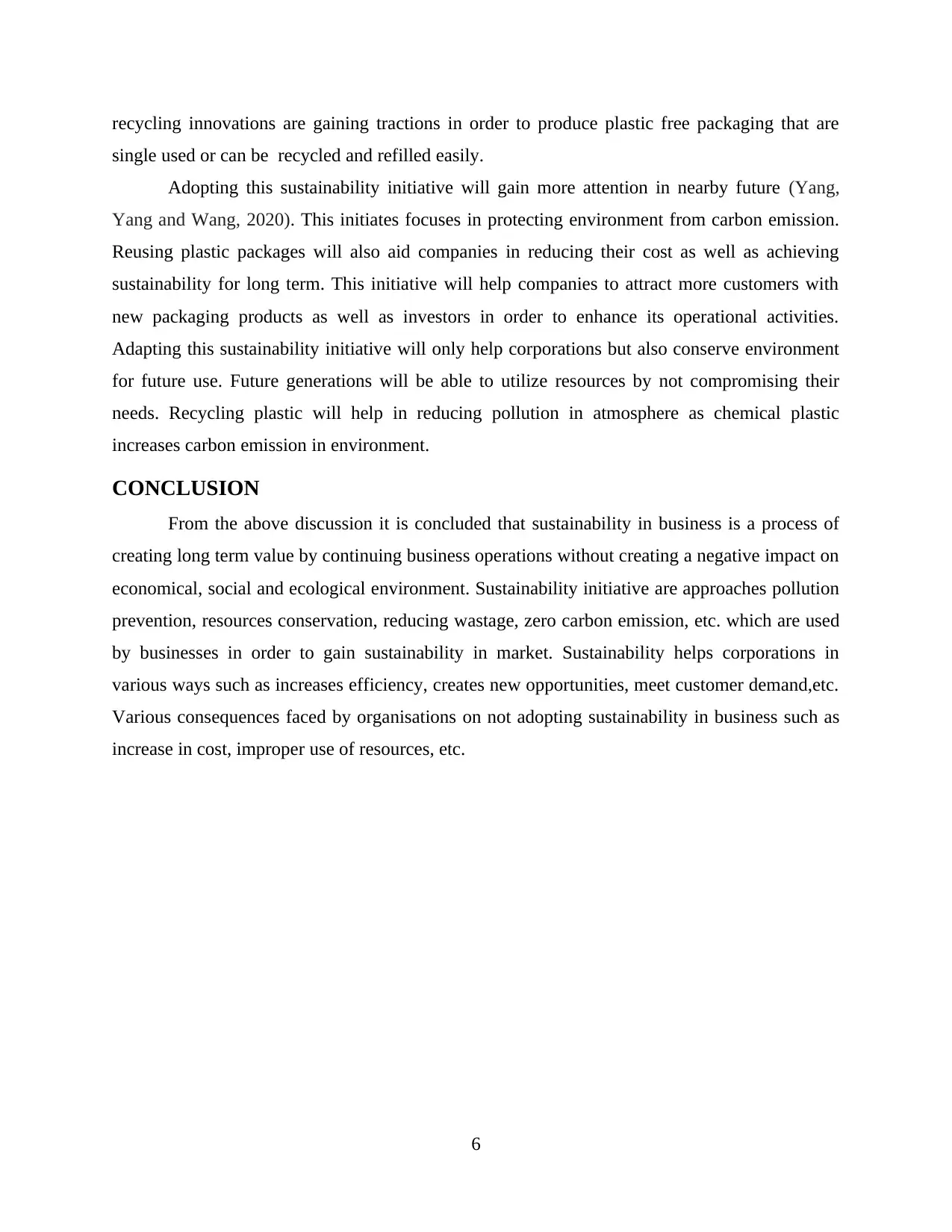
recycling innovations are gaining tractions in order to produce plastic free packaging that are
single used or can be recycled and refilled easily.
Adopting this sustainability initiative will gain more attention in nearby future (Yang,
Yang and Wang, 2020). This initiates focuses in protecting environment from carbon emission.
Reusing plastic packages will also aid companies in reducing their cost as well as achieving
sustainability for long term. This initiative will help companies to attract more customers with
new packaging products as well as investors in order to enhance its operational activities.
Adapting this sustainability initiative will only help corporations but also conserve environment
for future use. Future generations will be able to utilize resources by not compromising their
needs. Recycling plastic will help in reducing pollution in atmosphere as chemical plastic
increases carbon emission in environment.
CONCLUSION
From the above discussion it is concluded that sustainability in business is a process of
creating long term value by continuing business operations without creating a negative impact on
economical, social and ecological environment. Sustainability initiative are approaches pollution
prevention, resources conservation, reducing wastage, zero carbon emission, etc. which are used
by businesses in order to gain sustainability in market. Sustainability helps corporations in
various ways such as increases efficiency, creates new opportunities, meet customer demand,etc.
Various consequences faced by organisations on not adopting sustainability in business such as
increase in cost, improper use of resources, etc.
6
single used or can be recycled and refilled easily.
Adopting this sustainability initiative will gain more attention in nearby future (Yang,
Yang and Wang, 2020). This initiates focuses in protecting environment from carbon emission.
Reusing plastic packages will also aid companies in reducing their cost as well as achieving
sustainability for long term. This initiative will help companies to attract more customers with
new packaging products as well as investors in order to enhance its operational activities.
Adapting this sustainability initiative will only help corporations but also conserve environment
for future use. Future generations will be able to utilize resources by not compromising their
needs. Recycling plastic will help in reducing pollution in atmosphere as chemical plastic
increases carbon emission in environment.
CONCLUSION
From the above discussion it is concluded that sustainability in business is a process of
creating long term value by continuing business operations without creating a negative impact on
economical, social and ecological environment. Sustainability initiative are approaches pollution
prevention, resources conservation, reducing wastage, zero carbon emission, etc. which are used
by businesses in order to gain sustainability in market. Sustainability helps corporations in
various ways such as increases efficiency, creates new opportunities, meet customer demand,etc.
Various consequences faced by organisations on not adopting sustainability in business such as
increase in cost, improper use of resources, etc.
6
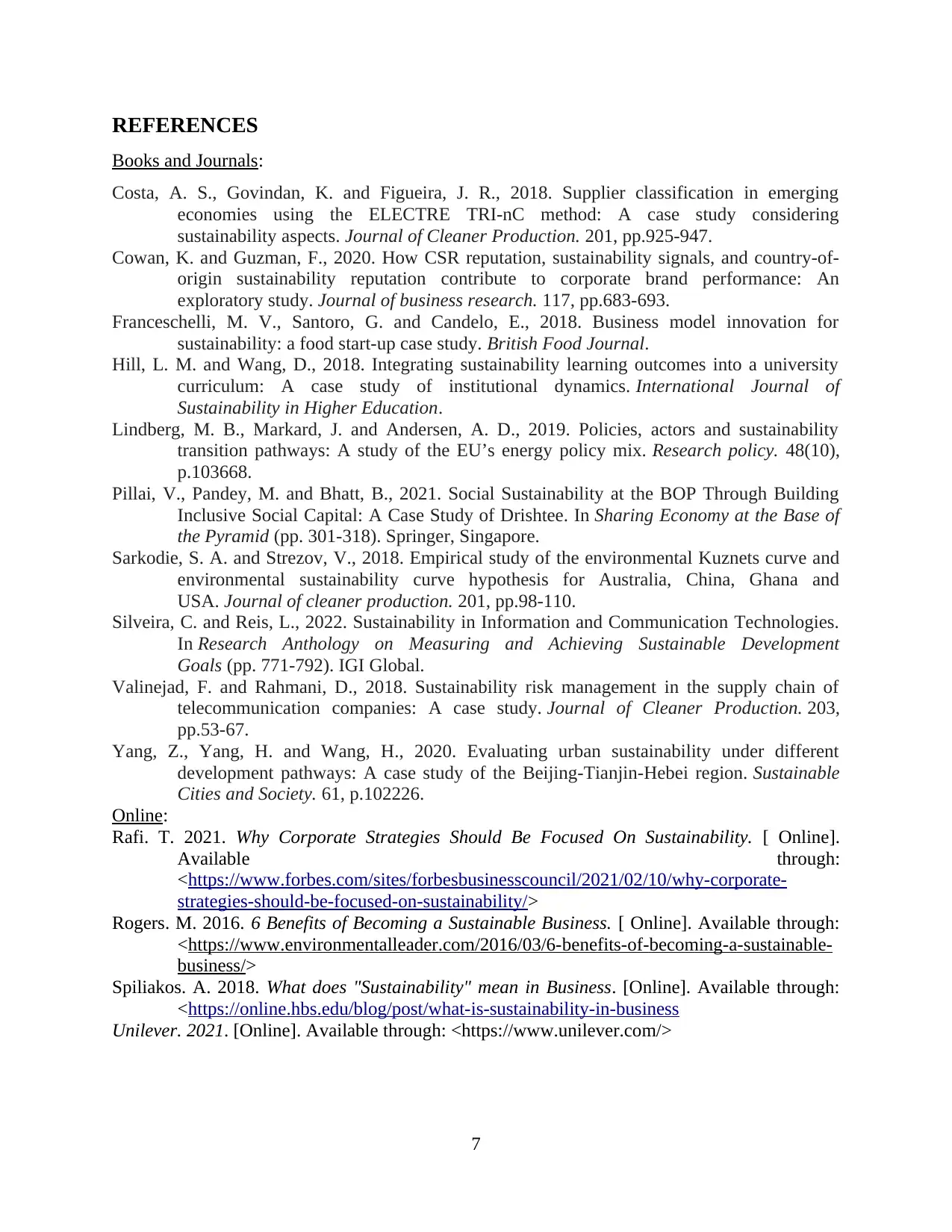
REFERENCES
Books and Journals:
Costa, A. S., Govindan, K. and Figueira, J. R., 2018. Supplier classification in emerging
economies using the ELECTRE TRI-nC method: A case study considering
sustainability aspects. Journal of Cleaner Production. 201, pp.925-947.
Cowan, K. and Guzman, F., 2020. How CSR reputation, sustainability signals, and country-of-
origin sustainability reputation contribute to corporate brand performance: An
exploratory study. Journal of business research. 117, pp.683-693.
Franceschelli, M. V., Santoro, G. and Candelo, E., 2018. Business model innovation for
sustainability: a food start-up case study. British Food Journal.
Hill, L. M. and Wang, D., 2018. Integrating sustainability learning outcomes into a university
curriculum: A case study of institutional dynamics. International Journal of
Sustainability in Higher Education.
Lindberg, M. B., Markard, J. and Andersen, A. D., 2019. Policies, actors and sustainability
transition pathways: A study of the EU’s energy policy mix. Research policy. 48(10),
p.103668.
Pillai, V., Pandey, M. and Bhatt, B., 2021. Social Sustainability at the BOP Through Building
Inclusive Social Capital: A Case Study of Drishtee. In Sharing Economy at the Base of
the Pyramid (pp. 301-318). Springer, Singapore.
Sarkodie, S. A. and Strezov, V., 2018. Empirical study of the environmental Kuznets curve and
environmental sustainability curve hypothesis for Australia, China, Ghana and
USA. Journal of cleaner production. 201, pp.98-110.
Silveira, C. and Reis, L., 2022. Sustainability in Information and Communication Technologies.
In Research Anthology on Measuring and Achieving Sustainable Development
Goals (pp. 771-792). IGI Global.
Valinejad, F. and Rahmani, D., 2018. Sustainability risk management in the supply chain of
telecommunication companies: A case study. Journal of Cleaner Production. 203,
pp.53-67.
Yang, Z., Yang, H. and Wang, H., 2020. Evaluating urban sustainability under different
development pathways: A case study of the Beijing-Tianjin-Hebei region. Sustainable
Cities and Society. 61, p.102226.
Online:
Rafi. T. 2021. Why Corporate Strategies Should Be Focused On Sustainability. [ Online].
Available through:
<https://www.forbes.com/sites/forbesbusinesscouncil/2021/02/10/why-corporate-
strategies-should-be-focused-on-sustainability/>
Rogers. M. 2016. 6 Benefits of Becoming a Sustainable Business. [ Online]. Available through:
<https://www.environmentalleader.com/2016/03/6-benefits-of-becoming-a-sustainable-
business/>
Spiliakos. A. 2018. What does "Sustainability" mean in Business. [Online]. Available through:
<https://online.hbs.edu/blog/post/what-is-sustainability-in-business
Unilever. 2021. [Online]. Available through: <https://www.unilever.com/>
7
Books and Journals:
Costa, A. S., Govindan, K. and Figueira, J. R., 2018. Supplier classification in emerging
economies using the ELECTRE TRI-nC method: A case study considering
sustainability aspects. Journal of Cleaner Production. 201, pp.925-947.
Cowan, K. and Guzman, F., 2020. How CSR reputation, sustainability signals, and country-of-
origin sustainability reputation contribute to corporate brand performance: An
exploratory study. Journal of business research. 117, pp.683-693.
Franceschelli, M. V., Santoro, G. and Candelo, E., 2018. Business model innovation for
sustainability: a food start-up case study. British Food Journal.
Hill, L. M. and Wang, D., 2018. Integrating sustainability learning outcomes into a university
curriculum: A case study of institutional dynamics. International Journal of
Sustainability in Higher Education.
Lindberg, M. B., Markard, J. and Andersen, A. D., 2019. Policies, actors and sustainability
transition pathways: A study of the EU’s energy policy mix. Research policy. 48(10),
p.103668.
Pillai, V., Pandey, M. and Bhatt, B., 2021. Social Sustainability at the BOP Through Building
Inclusive Social Capital: A Case Study of Drishtee. In Sharing Economy at the Base of
the Pyramid (pp. 301-318). Springer, Singapore.
Sarkodie, S. A. and Strezov, V., 2018. Empirical study of the environmental Kuznets curve and
environmental sustainability curve hypothesis for Australia, China, Ghana and
USA. Journal of cleaner production. 201, pp.98-110.
Silveira, C. and Reis, L., 2022. Sustainability in Information and Communication Technologies.
In Research Anthology on Measuring and Achieving Sustainable Development
Goals (pp. 771-792). IGI Global.
Valinejad, F. and Rahmani, D., 2018. Sustainability risk management in the supply chain of
telecommunication companies: A case study. Journal of Cleaner Production. 203,
pp.53-67.
Yang, Z., Yang, H. and Wang, H., 2020. Evaluating urban sustainability under different
development pathways: A case study of the Beijing-Tianjin-Hebei region. Sustainable
Cities and Society. 61, p.102226.
Online:
Rafi. T. 2021. Why Corporate Strategies Should Be Focused On Sustainability. [ Online].
Available through:
<https://www.forbes.com/sites/forbesbusinesscouncil/2021/02/10/why-corporate-
strategies-should-be-focused-on-sustainability/>
Rogers. M. 2016. 6 Benefits of Becoming a Sustainable Business. [ Online]. Available through:
<https://www.environmentalleader.com/2016/03/6-benefits-of-becoming-a-sustainable-
business/>
Spiliakos. A. 2018. What does "Sustainability" mean in Business. [Online]. Available through:
<https://online.hbs.edu/blog/post/what-is-sustainability-in-business
Unilever. 2021. [Online]. Available through: <https://www.unilever.com/>
7
⊘ This is a preview!⊘
Do you want full access?
Subscribe today to unlock all pages.

Trusted by 1+ million students worldwide

8
1 out of 10
Related Documents
Your All-in-One AI-Powered Toolkit for Academic Success.
+13062052269
info@desklib.com
Available 24*7 on WhatsApp / Email
![[object Object]](/_next/static/media/star-bottom.7253800d.svg)
Unlock your academic potential
Copyright © 2020–2026 A2Z Services. All Rights Reserved. Developed and managed by ZUCOL.





